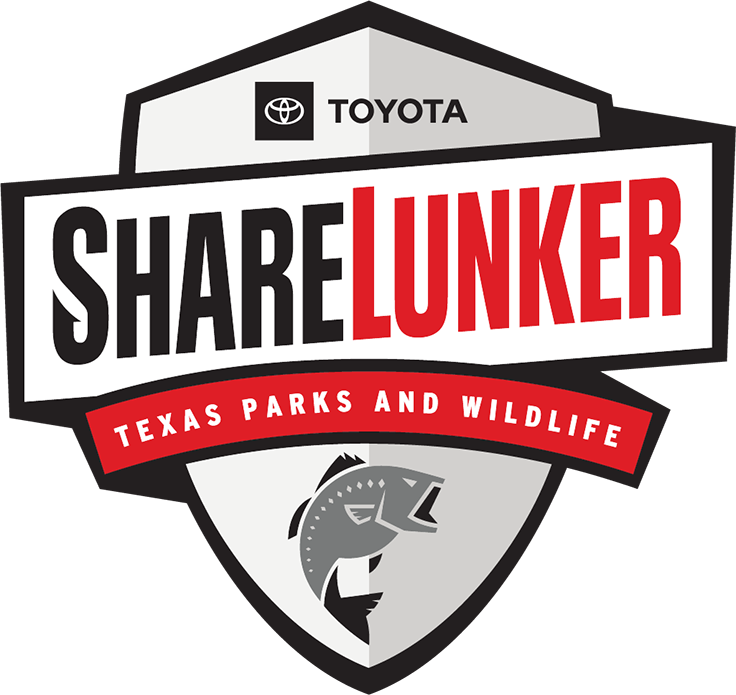Bigger Better Science
The Texas Parks and Wildlife Dept. biologists apply the most advanced scientific methods to make bass fishing bigger and better for our anglers.
Texas Parks and Wildlife Department management biologists collect data on bass populations during electrofishing surveys, but there is a bias with the gear and management teams do not sample the larger size class of bass in the proportion they are represented in the population. Biologist also supplement their data sets with creel surveys and tournament results. However, there are still groups of anglers that are catching big bass year-round, but data wasn’t being collected on these anglers’ catches.
In 2018, the Toyota ShareLunker program underwent expansion, deepening its partnership with anglers to gather extensive catch and genetic information about lunker bass throughout Texas.
With anglers submitting catch data on big bass, it allows management biologist to determine a reservoir’s lunker potential.
Why Taking a Genetics Sample is Important
Sending in a genetic sample from your Lunker can benefit the conservation and enhancement of trophy bass populations in Texas. And, it will contribute to scientific research and the overall understanding of Largemouth Bass genetics. It's a win-win for everyone.
Here's how sending in a genetic sample to the Toyota ShareLunker program can be valuable:
- Genetic Research: Genetic samples, such as fin clips or scales, from trophy-sized bass can provide important genetic information. This information can be used to study the genetic diversity, lineage, and relatedness of these exceptional fish. It can also help researchers understand the genetic factors that contribute to the growth potential and trophy size of Largemouth Bass.
- Parentage Analysis: Genetic samples can be used to determine the parentage of individual fish, helping researchers understand reproductive patterns, kinship relationships, and genetic contributions to the population.
- Breeding and Stocking Programs: The genetic samples collected through the ShareLunker program can be used in breeding programs to produce broodstock for stocking efforts. This can help enhance the genetic diversity of Largemouth Bass populations, improve trophy bass genetics, and ultimately promote the growth of trophy-sized fish in Texas waters.
- Angler Recognition: Anglers who submit trophy-sized bass to the ShareLunker program receive recognition for their contribution to bass conservation and research. The program acknowledges and celebrates anglers who catch and share data from their trophy bass.
- Public Awareness/Education: The ShareLunker program can raise public awareness about the importance of trophy bass conservation and responsible angling practices. It encourages anglers to support the sustainable management of Largemouth Bass in Texas and raise awareness about bass genetics and conservation.
If you catch a trophy-sized Largemouth Bass and wish to participate in the ShareLunker program, just follow the program's specific guidelines from Texas Parks and Wildlife Department on how to submit genetic samples and information about your catch.
Send in your lunker's DNA Sample and get a Lew's baitcast reel*
TPWD fisheries biologists have learned a great deal from genetic scale samples donated by Texas bass anglers. They are eager to receive more data, but for that we'll need your help. So, anglers who contribute a lunker scale sample will receive a Lew's baitcast reel, valued at up to $200, while supplies last*. Plus, all anglers who send in a genetic sample will get a 3-month subscription to Bass University and an entry in the Bass Pro Shops $5,000 Shopping Spree.
*Limit of 1 Lew's baitcast reel per angler, while supplies last, valued up to $200.
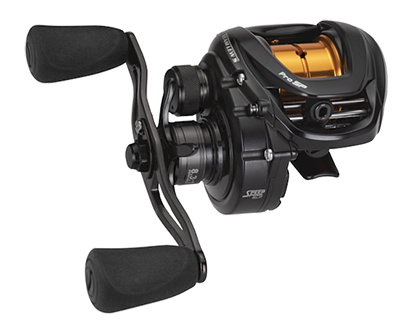
How to Provide a DNA Scale Sample
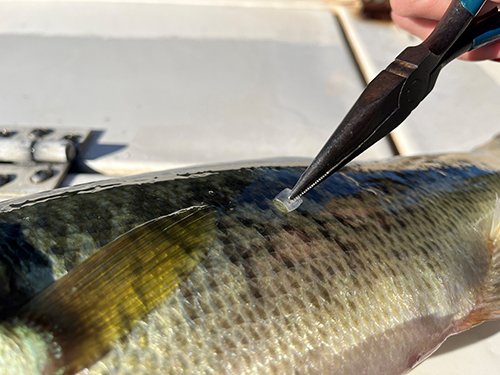
Please complete the following 3 easy steps to provide fish DNA scale samples for Genetic Analysis.
- Collect and Clean: Carefully remove three scales from the fish using a clean tool (fingernail, forceps, etc.) or from a clean surface (e.g., net, measuring board, etc.). Don’t worry it won’t hurt the fish and only takes about 10 seconds! If collecting samples for more than one fish, be sure to rinse or wipe the tool/surface with lake water or alcohol wipes between fish to avoid contamination.
- Dry: Press the scales between clean paper towels to thoroughly dry them. Discard the used paper towels, do not use them for storage.
- Package and Send: Place the dried scales between a new paper towel and put them in a small envelope (coin envelope is ideal, do not store in plastic bags), write your name and submission number (from the app) on the envelope. Store the envelope in a dry place (room temperature, air-conditioned room is best) and mail it in an envelope to:
Attn: Genetics Lab
505 Staples Road (building #2)
San Marcos, TX 78666
How to Take Genetic Samples Video
Our friends at The Bass University (a Prize Sponsor of the Toyota ShareLunker Program) created this short video to show how to collect genetic samples safely and effectively from ShareLunker bass.
The ancestry information below highlights some of our known genetic relationships within the ShareLunker program.
Genetic profiles can be used to uniquely identify individuals as well as identify family relationships. TPWD collects a tissue sample from every fish entered in the ShareLunker program. These findings make it possible to evaluate the relationships among ShareLunker fish.
"If a contemporary ShareLunker is a descendant of a ShareLunker donated to TPWD years ago, we will know - given we collected some tissue or have an old scale or bone from its mom or dad." - Dijar Lutz-Carrillo, TPWD Geneticist
Generation 1

SL 9: 16.13 lbs Gibbons Creek Reservoir Lake Record by Troy Johnson January 15, 1988
SL 9 was paired in 1988 with an unknown male broodfish producing a male offspring. That male offspring was kept in our hatchery system as a future broodfish.
Generation 2
The male hatchery broodfish offspring of SL 9 was then paired in 1994 with SL 184, producing a male offspring kept in our hatchery system as a future broodfish.
Generation 3
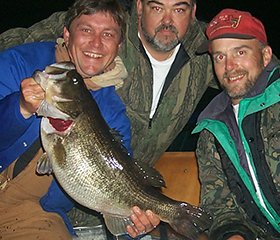
SL 305: 14.67 lbs Lake Fork by Nathan Strickland February 19, 2000
The male hatchery broodfish offspring of SL 184 was then paired in 2000 with SL 305, producing three male offsprings (OLB-0499, OLB-0504 and OLB-0518) kept in our hatchery system as future broodfish.
Generation 4 and Offspring
SL 365
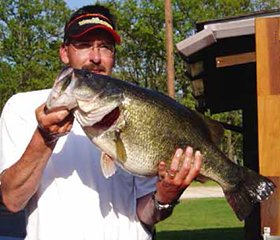
SL 365: 13.19 lbs Lake Fork by Jeffery Erpelding April 3, 2004
Paired with Male Broodfish OLB-0499 ShareLunker Offspring.
SL 365 Offspring
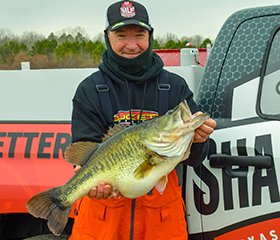
SL 578: 13.79 lbs TPWD Research Lake by Gary Klein February 8, 2019
SL 370
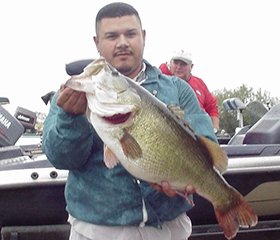
SL 370: 14.28 lbs Lake Falcon by Jerry Campos December 4, 2004
Paired with Male Broodfish OLB-0518 ShareLunker Offspring.
SL 370 Offspring
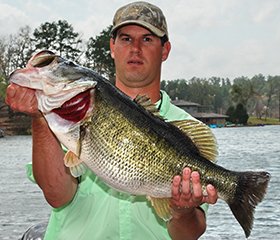
SL 450: 14.50 lbs Tyler State Park, Lake Record by Brett Harris March 17, 2008
Paired with Male Broodfish OLB-0606 ShareLunker Offspring.
SL 450 Offspring
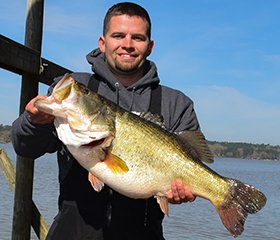
L 583: 15.34 lbs Lake Nacogdoches, Lake Record by Joe Castle February 29, 2020
SL 410

SL 410: 14.48 lbs Lake Conroe by Edward Reid March 22, 2006
Paired with Male Broodfish OLB-0504 ShareLunker Offspring.
SL 410 Offspring
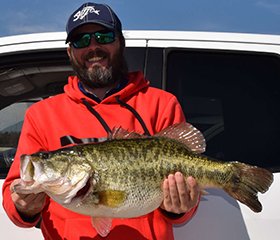
SL 566: 13.07 lbs Marine Creek Lake, Lake Record by Rynder Wicker February 10, 2017
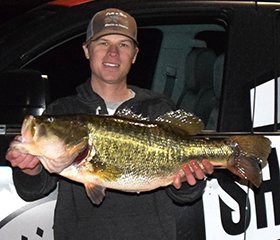
SL 577 14.57 lbs Marine Creek Lake, Lake Record by Zachary Sypert January 26, 2019
Unknown Pairing
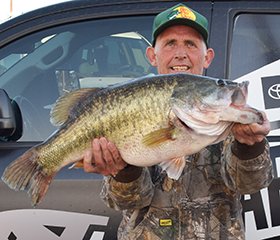
SL 602 14.83 lbs Lake Coleman, Lake Record by C.R. Stevenson III March 14, 2021
 Home
Home